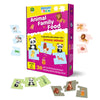Introduction: Why Failure is a Stepping Stone to Success
Failure is often seen as something to avoid, but for children, it can be one of the most valuable teachers. When kids face setbacks, they learn to navigate challenges, develop critical thinking, and build emotional strength. Parents play a crucial role in guiding their children through these moments, helping them see failure not as a flaw but as an essential part of growth. With the right approach, even life’s smallest defeats can become opportunities for brain development and resilience.
Understanding the Role of Failure in a Child’s Development
- The Value of Making Mistakes
Mistakes are essential for brain development in children. They encourage creativity and problem-solving, enabling kids to approach challenges with confidence. Whether during a winter break or in everyday learning, making errors teaches them that perfection isn’t the goal—progress is.
- How Failure Shapes Emotional Growth
The Role of Parents in Helping Children Embrace Failure
- Setting the Right Example
- Encouraging Open Conversations
- Avoiding Overprotection
While it’s natural to want to shield children from failure, doing so robs them of vital learning opportunities. Allowing small setbacks—like losing in a game or struggling with a puzzle—helps kids develop independence and problem-solving skills.
Practical Ways to Teach Resilience Through Failure
- Praising Effort, Not Just Success
Celebrate the process rather than just the outcome. Acknowledge the hard work and persistence children put into tasks, whether it’s writing a story or solving a tricky puzzle. This approach shifts their focus from fearing failure to appreciating growth.
- Normalising Failure with Stories
Children's story books are fantastic tools for teaching resilience. Titles that showcase characters overcoming challenges help kids understand that setbacks are universal and temporary. Including stories in their reading routine during a winter break can inspire a positive perspective on failure.
- Celebrating Small Wins After Setbacks
Acknowledge progress, even if it’s incremental. Whether a child masters a skill they initially struggled with or completes a project after several tries, celebrating these victories reinforces the value of perseverance.
Creating a Supportive Environment for Growth
- Encouraging Problem-Solving
Guide children to analyse their mistakes and brainstorm ways to improve. For instance, if they struggle with writing, encourage them to revisit their work and try again. Providing tools like children writing books can support this process, making learning engaging and productive.
- Balancing Expectations
Unrealistic goals can overwhelm children, leading to fear of failure. Instead, set achievable milestones, such as finishing a short reading book or tackling a manageable project. This balance builds confidence while allowing room for growth.
- Fostering a Growth Mindset
Teach kids that their abilities can improve with effort. Encourage them to view mistakes as stepping stones toward mastery, whether it’s in academics, creative pursuits, or personal development.
Conclusion: Raising Resilient and Confident Kids
Failure isn’t the end—it’s a beginning. When parents guide their children to embrace setbacks, they nurture resilience, creativity, and mental health. Through open conversations, engaging activities, and relatable children's book names, families can turn life’s challenges into learning moments. By fostering a growth mindset, parents empower kids to face future hurdles with confidence and determination, creating a foundation for lifelong success.








